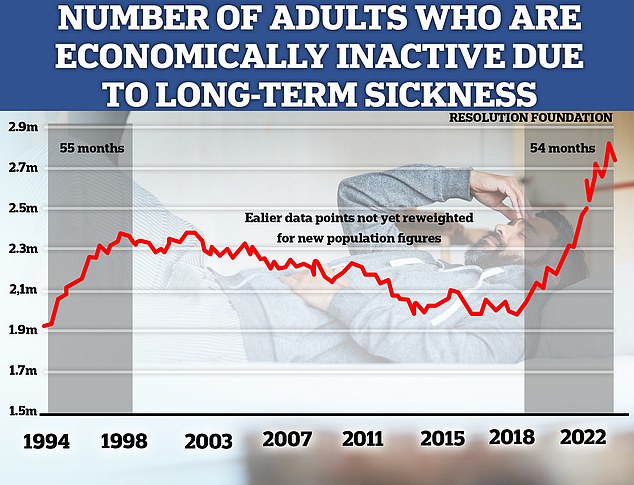UK sick note crisis deepens: Shocking 82 per cent of 2.75 million disability benefit claimants have taken at least TWO YEARS off
More than four in five people claiming disability benefits have not worked in the past two years, according to an analysis highlighting the UK’s sick note crisis.
The Institute for Fiscal Studies (IFS) said the figures illustrate the challenge the government faces as it seeks to get more people back to work and boost growth.
Separate official figures showed the number of people absent due to long-term illness fell slightly to 2.75 million, the lowest level in almost a year, although it remains close to record highs.
The IFS said getting more disability benefit claimants back into work was an “understandable goal” after their numbers rose 28 percent to 3.2 million since 2019.
The IFS figures show that only 5.1 percent of disability benefit claimants were working, while 82.9 percent had not worked in the past two years.
Analyzes show that more than four in five people who apply for disability benefits have not worked in the past two years

Britain has had the longest-running absenteeism epidemic for a quarter of a century, with the youngest and oldest workers driving the trend, recent analysis shows
“The longer someone is out of work, the less likely they are to return to work,” the report said.
It also said that 83 percent of applicants had ‘the most severe level of disability’, meaning they are ‘likely still some way from returning to the labor market’.
Eduin Latimer of the IFS said: ‘There are unlikely to be easy solutions to the rising proportion of the population unemployed due to poor health.’
The news comes after an earlier report showed that unemployment due to long-term illness in parts of Britain has increased sixfold since pre-Covid.
In July, the number of people languishing at home due to illness peaked at 2.8 million, up from about 700,000 before the pandemic upended the country.
Rising rates of mental health problems have caused the ‘economic inactivity crisis’, which Labor has pledged to tackle as part of its plans to boost the economy and save taxpayers billions in benefits.
Shockingly, young people are now as likely to be unemployed due to long-term illness as those in their forties, according to the Resolution Foundation.
A MailOnline analysis of official statistics shows that it is estimated that more than 14 percent of Dover’s working-age population is now ‘economically inactive’ due to a long-term illness, or 9,700 people.
By comparison, in 2019-2020 this figure was almost 2.5 percent.
And earlier this year it was revealed that rising workplace illness is costing UK businesses an additional £30 billion a year, with the number of sick days doubling since 2018, a report has found.
Employees now report sick on average 6.7 days per year, compared to 3.7 days six years ago.
This means the annual cost of staff absenteeism has risen by £5 billion over this period, according to analysis by the Institute for Public Policy Research.
However, the biggest costs to business come from ‘presenteeism’, where Britons turn up for work despite not feeling well and unable to give their best, the think tanks claim.
According to the report, the average worker now loses the equivalent of 44 days of productivity per year due to illness.
This is an increase on the 35 days since 2018, with the extra slack days boosting profits by £25 billion a year, researchers found.
IFS data also showed a 150 per cent increase in new disability claims among the over-40s in the past four years – and a sharp rise in mental health benefit claims.
The research highlighted how benefit claims are rising much faster in Britain than elsewhere – even though other comparable countries have also seen an increase in the number of reported disability cases.
